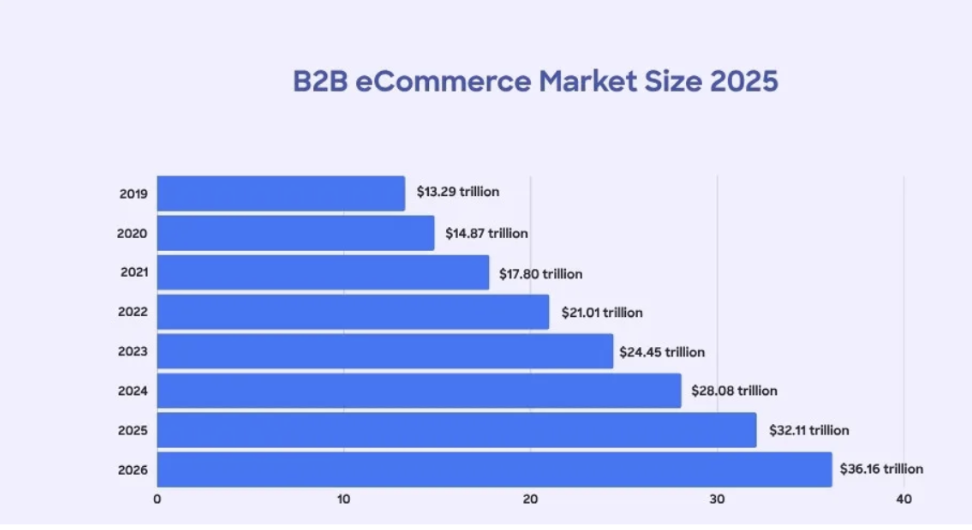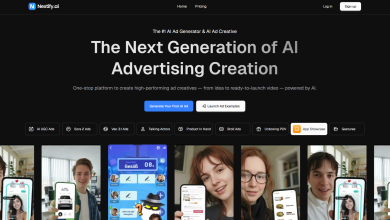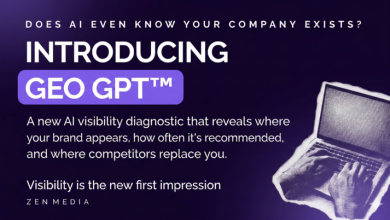
The short-lived era of swipe-post-like marketing is over. AI quietly embedded itself into the backend of digital systems and transformed how businesses communicate – not just with customers, but with each other.
60% of B2B marketers plan to increase investments in both social media advertising and AI tools in 2025.
What used to be a one-size-fits-all broadcast has morphed into something sharper, faster, and far more personalised. B2B teams that used to rely on templated sales scripts pivoted to AI-driven predictive lead scoring, hyper-specific targeting, and round-the-clock conversations that feel human – even when they’re not.
From lead generation, through negotiation, and past the point of sale into support and retention, AI isn’t just a part of the B2B sales funnel – it’s becoming the funnel.
AI Agents: Licensed to Close
The age of Agentic AI – the game-changing evolution of Artificial Intelligence that empowers AI agents to act autonomously – is upon us. AI systems accelerate sales cycles by anticipating buyer needs and providing guidance before prospects even visit company websites.
The explosion of AI marketing software has transformed social media platforms into mediums of dynamic dialogue. B2B organisations are improving conversion rates by using AI across early-stage communication, moving enquiries quickly through workflows – until buyer intent is clear and human intervention is essential. Platforms like Gupshup manage multi-step conversational flows, answer customer queries across WhatsApp, Facebook Messenger, and email – while feeding lead generation data into CRM systems.
Right Message, Right Person, Right Time: AI’s Triple Threat
AI systems customise social media content based on buyer personas and stages of the sales funnel. Deciding who sees what, when and in what format, content is relevant, timely, and tailored to specific business needs.
Beyond Vanity Metrics: When AI Finally Measures What Matters
Machine learning algorithms evaluate social media advertising, helping sales teams to focus on prospects most likely to convert.
Predictive analytics for campaign optimisation use AI to identify which messaging strategies and platforms perform best with specific B2B audiences, enabling the optimisation of campaigns before they are launched.
This progression from counting likes to asking “did this content move someone closer to a sale?”, spotlights how social media interactions contribute to B2B sales and revenue.
- Hubspot’s AI-powered analytics scores leads based on social engagement and behaviour
- LinkedIn Sales Navigator uses AI to identify high-quality B2B prospects
- Salesforce Einstein integrates predictive lead scoring with CRM data and social interactions
- Google Analytics Intelligence shares AI-driven insights for social campaigns
- Brandwatch is an advanced AI system for competitor analysis and market intelligence
- 6Sense dives into predictive analytics specifically designed for B2B buyer journey mapping
- Lately uses AI to create and optimise B2B social content based on performance data
An effective social media approach involves combining AI tools to create a comprehensive AI-powered social media strategy that covers lead generation, content optimisation and performance analytics. Staff are released from repetitive, manual tasks, freeing valuable time to shift attention to building strategic initiatives.
Escaping Content Hell: How AI Tackles B2B’s Multi-Stakeholder Nightmare
From a business perspective, standing out on social media has become increasingly difficult as more B2B companies look to take advantage of AI opportunities, due to the ever-growing Market Size.
Whether you are running your own marketing or using a digital marketing agency, it’s important to set yourself apart from the pack.
This crowded digital landscape demands social media content that is consistently refreshed. The average B2B buyer consumes 13 pieces of content before making a purchase 89 B2B Marketing Statistics You Need to Know in 2025, highlighting the need for consistent, high-quality content to cut through the noise.
B2B social media also faces unique issues that consumer marketing doesn’t encounter:
- Sales cycles can stretch across months or years.
- A multitude of stakeholders can result in several required approaches: a CEO and IT Director look for different things: strategy vs implementation. Tailored content is needed yet both must be engaged via social platforms.
Manual content creation and distribution could not support such a multi-layered approach. Yet AI-driven content automation systems excel at such complex B2B scenarios.
- Tools that understand a B2B buyer journey, such as Jasper AI and Copy.ai, offer B2B templates plus technical product descriptions tailored for LinkedIn, Twitter, and industry-specific platforms.
- Canva’s AI Design Assistant automatically creates professional visual content that can align to corporate brand guidelines.
- Lumen5 produces engaging video content for social media posts, transformed from lengthy B2B reports.
60% of US B2B marketers plan to boost spending on AI tools and on social media advertising in 2025
Multi-platform B2B campaign orchestration is recognised as the most sophisticated application of AI automation. Businesses can:
- Know when procurement teams are most active on LinkedIn or Twitter/X and optimise post timings for maximum B2B engagement (Hootsuite’s AI)
- Integrate with social media advertising platforms to automatically engage prospects who interact with B2B content, using intelligent Chatbot conversations that excel at industry-specific terminology (Drift’s Conversational AI).
- Learn which types of content generate the most qualified leads and automatically adjust future content calendars to high-performing formats (Sprout Social’s AI analytics).
- Implement hashtags and posting times to maximise reach among B2B decision-makers, without manual processing (SEMrush’s Social Media Toolkit).
Metrics for B2B workflows often need to align with much longer sales cycles and higher-value transactions than B2C. HubSpot’s Social Media Management integrates with CRM systems to show how specific social media posts contribute to closed deals and generates reports with measurable business outcomes of ROI for B2B stakeholders.
Your Always-On Sales Rep: Chatbots That Actually Close Deals
AI Chatbots feed lead generation data into CRMs, automate FAQs, spotlight product recommendations, answer curated industry or product-specific queries, and link enquiries to sales pages. Pre-programmed responses ensure a consistent brand voice and B2B buyers have instant 24/7 support.
The Zero Click Reality: How to Win When Google Stops the Traffic
Generative AI has transformed traditional search engines and how users consume the results. With an output that’s more conversational in tone – replacing the standard list of links with a general overview – it is visually more engaging and often comes with interactive elements and source attribution.
While generative search may seem like a minor development in AI’s broader integration, it is fundamentally changing how the internet is used, and which digital marketing strategies you should employ.
Around 60% of global searches ended in zero clicks in 2024, with only 360-374 clicks per 1,000 searches reaching the open web.
By giving a detailed answer, generative search often results in zero-click: the user no longer has a need to click through to a website for further information.
As results are pulled from both web content and social media, B2B businesses must integrate effective digital marketing strategies that cement a strong online presence. Each social media advertising strategy should be structured as a complete, standalone answer from which AI systems can extract and present in search results. Consistently refreshing engaging content can significantly influence how a brand’s content is perceived and ranked within generative search results.
Think Global, Act Hyperlocal: AI’s Mind-Reading Marketing Tricks
AI technology enables precise hyperlocal targeting capabilities. Tools such as Generate with Genius leverage AI-powered agents that combine business insights, hyperlocal data and intelligent automation to create localised social media posts. These highly relevant posts align with both the brand’s voice and the local audience’s preferences.
Staying Human in a Bot World: The Authenticity Tightrope
As AI-generated content spreads across social media platforms, businesses face growing challenges to maintain authentic brand connections. The growth of private communities via LinkedIn or Facebook groups, Slack workspaces or similar, provide a safe space for users to share authentic reviews.
AI tools such as Mighty are available to moderate such communities. Integrate and use to highlight key contributors, to tailor email campaigns that reinforce loyalty and elevate brand and new product awareness.
These communities are often the brand’s strongest advocates and should be one of their main digital marketing strategies.
The 2026 Takeover: When AI Stops Assisting and Starts Running the Show?
Marketers face the constant challenge of finding avenues to integrate human relevance into an increasingly automated world.
AI marketing systems, though technically sophisticated, cannot replicate human emotional intelligence, leaving social media marketers also tasked with continually reigning in AI to help with human creativity.
All the major tech giants – Meta, Google, Amazon, TikTok and Snapchat – have announced an industry-wide shift in 2026 to complete automation.
- Meta’s ambitious plan for 2026: to fully automate advertising by end of year. Input assets, budgets, and AI should generate complete campaigns that include video, images and branded copy, ready for roll out across Instagram and Facebook.
- Google’s AI Max revolution promises something close to a fully integrated advertising “ecosystem” that runs with minimal human intervention. AI will handle everything from keyword research to bid optimisation to creative generation.
Google plans to generate video content from static images and text descriptions, resizing into any aspect ratio for cross platform placement. B2B-specific enhancements such as tailoring to longer sales cycles and complex buying processes are promised.
Hyper-Personalised content recommendations are promised as AI analysis spreads to social media interactions, viewing habits, and purchase histories.
Predictive capabilities for anticipating user needs are still technically challenging, yet as AI technology spreads into more sectors, it’s on the horizon.
Advanced Chatbot technology will significantly improve customer engagement capabilities.
Expect an influx of AI tools that check the authenticity of AI-generated content. While seemingly contradictory, AI content authentication tools are essential in supporting platform credibility.
The integration of AI tools will continue to run parallel with human-led accountability. Marketing teams will continue to review B2B branding and content generated by AI-systems, with the ideal approach centered on collaborative AI marketing: AI-generated but not AI-managed.
Your AI-Action Plan: 8 Ways to Start Without Breaking Everything
- Start small and smart
Review your current workflows and identify areas where AI can quietly boost efficiency, by automating replies, qualifying leads, or handling basic content scheduling. - Pilot before you scale
Try new AI tools for 1-2 months, measuring their impact. As just because a tool worked wonders elsewhere doesn’t mean it’ll fit your business. - Keep humans in control
Use AI to support your team’s creativity and decision-making. Set boundaries so it’s clear what AI handles and where human judgement continues to rule the day. - Less IS better
Three useful, relevant posts a week will go further than a flood of forgettable content. Always prioritise value over volume. - Lead with strategy
AI tools are there to help deliver your plan, not create it. Build your editorial calendar based on business goals and move forward using AI to bring it to life. - Own your audience
Focus on growing private communities and email lists, places where you control the connection. - Optimise for the real answer
AI-driven search is changing how people discover content. Make yours clear, practical, and complete. Consider what questions users might pose and theme social media postings that bring clarity and answers. - Skill up your team
If you’re serious about using AI, invest in helping your people learn how to use it well, or look to contract a digital marketing agency specialising in AI.
Author:
Seb Brantigan
Co-founder and COO of DBSS Digital






